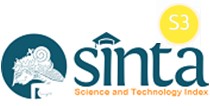Urban platform approach in Covid-19 pandemic management (case of Semarang and Yogyakarta, Indonesia)
Abstract
Keywords
Full Text:
PDFReferences
[1] Ghosh B, Arora S. Smart As (Un)democratic? The Making of A Smart City Imaginary in Kolkata, India. Environ Plan C Polit Sp 2022;40:318–39. https://doi.org/10.1177/23996544211027583.
[2] Deslatte A, Hatch ME, Stokan E. How Can Local Governments Address Pandemic Inequities? Public Adm Rev 2020;80:827–51. https://doi.org/10.1111/puar.13257.
[3] Aminullah E, Erman E. Policy Innovation and Emergence of Innovative Health Technology: The System Dynamics Modelling of Early COVID-19 Handling in Indonesia. Technol Soc 2021;66. https://doi.org/10.1016/j.techsoc.2021.101682.
[4] Sturzaker J, Verdini G. Opposition and Resistance: Governance Challenges Around Urban Growth in China and The UK. J Urban Manag 2017;6:30–41. https://doi.org/10.1016/j.jum.2017.02.001.
[5] Healey P, Cars G, Madanipour A, de Magalhães C. Urban Governance, Institutional Capacity and Social Milieux. London: Routledge; 2002. https://doi.org/10.4324/9781315202877.
[6] Oliveira V, Pinho P. Evaluation in Urban Planning: Advances and Prospects. J Plan Lit 2010;24:343–61. https://doi.org/10.1177/0885412210364589.
[7] Friedmann J. Planning in the Public Domain: From Knowledge to Action. Princeton: Princeton University Press; 1987. https://doi.org/10.2307/j.ctv10crf8d.
[8] Sulaeman ES, Murti B, Waryana. Peran Kepemimpinan, Modal Sosial, Akses Informasi serta Petugas dan Fasilitator Kesehatan dalam Pemberdayaan Masyarakat Bidang Kesehatan. Kesmas J Kesehat Masy Nas 2015;9:353–61.
[9] Davey KJ. Urban Management: The Challenge of Growth. Aldershot: Avebury; 1996.
[10] Bačlija I. Urban Management in A European Context. Urbani Izziv 2011;22. https://doi.org/10.5379/urbani-izziv-en-2011-22-02-006.
[11] Mattingly M. Private Development and Public Management of Urban Land: A Case Study of Nepal. Land Use Policy 1996;13:115–27. https://doi.org/10.1016/0264-8377(95)00036-4.
[12] Bollier D. The City as Platform: How Digital Networks Are Changing Urban Life and Governance. Washington: The Aspen Institute; 2016.
[13] Parker GG, Van Alstyne MW, Choudary SP. Platform Revolution: How Networked Markets Are Transforming the Economy and How to Make Them Work for You. New York: W. W. Norton & Company; 2016.
[14] Pemerintah Kota Semarang. Kota Semarang Siaga Corona. Pemerintah Kota Semarang 2021.
Refbacks
- There are currently no refbacks.


.png)

.jpg)









